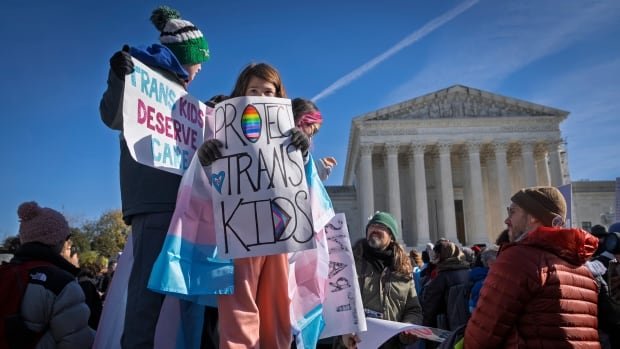Physical Address
304 North Cardinal St.
Dorchester Center, MA 02124
Physical Address
304 North Cardinal St.
Dorchester Center, MA 02124

The United States’ highest court will decide whether a state ban on providing gender-affirming medical care to minors is unconstitutional. The landmark case could have serious ramifications for transgender people across the country — and not just when it comes to their health care.
Here’s what you need to know.
the case United States v. Skrmettifocuses on a law in Tennessee that bans gender-affirming medical care for minors under 18, such as drugs that delay puberty, hormone therapy and surgery to treat gender dysphoria, the distressing feeling people experience when their gender identity is not the same as the gender they were assigned at birth.
Under a Tennessee law passed last year, medical providers who administer these treatments can be sued, fined or otherwise professionally disciplined.
The justices are being asked to rule on whether the Tennessee law violates the U.S. Constitution — specifically the 14th Amendment’s equal protection clause — by making distinctions based on gender. They do not make decisions about the medical care of transgender minors.
The U.S. Supreme Court is set to hear arguments in a landmark transgender rights case testing whether a Tennessee Republican-backed ban on medical care for gender-affirming transgender minors violates the U.S. Constitution.
No. A wave of conservative state legislators have approved similar policies across the country in recent years, but the one made in Tennessee is the only one being heard by the US Supreme Court.
This is the first time the nation’s highest court will rule on a state ban denying medical care to gender-affirming youth. It is also only for the second time in four years that the court had to decide the extent to which federal law protects transgender people from discrimination.
The top Supreme Court lawyer in the Biden administration warned that the decision involved Tennessee could be used to justify statewide restrictions on health care for transgender minors. On the other hand, a ruling against Tennessee could open the door to similar policies in other states.

It can also go beyond healthcare. The ruling could affect efforts to regulate other aspects of transgender Americans’ lives, such as which sports they can join and which bathrooms they can use.
Six of the nine justices are conservative, and three were appointed by President-elect Donald Trump when he was in the White House from 2017 to 2021. During the presidential election campaign, Trump and his allies promised to repeal transgender protections.
After hearing two hours of arguments Wednesday, the court appears likely to uphold Tennessee’s ban. The three liberal justices appeared inclined to agree with the challengers, but did not have enough seats to influence the decision.
A verdict is expected by the end of June 2025.